CEILS Teaching Guide:
CEILS Remote Teaching Webinar Recordings
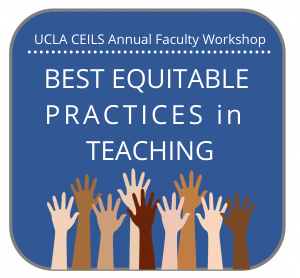
Facilitated by CEILS Assistant Director Katie Dixie, Associate Director Jess Gregg, Interim Director Rachel Kennison, Associate Director Katie Healey, Postdoctoral Scholar JoAnn Roberts, Senior Associate Director Shanna Shaked, and Associate Director Supriya.
Description: This 2-day workshop (September 14-15) prepared instructors for Fall 2021 classes by providing equitable teaching strategies that maximize success for all students.
Learning Goals: Participants will work towards becoming an equity-minded practitioner by…
For a full list of resources shared during all of our sessions, please view the 2021 Faculty Workshop Resource Guide. Our Special Edition Newsletter, also includes highlights from our 2021 Faculty Workshop, along with resources organized by topic.

During our welcome session we were grateful to have Dean Tracy Johnson and Associate Dean Albert Courey provide some context for our workshop and welcome the participants. A quote from Dean Johnson highlights some of the important lessons that we can apply in our approach to education and collegiality:
“One of the most important things I’ve learned from [CEILS] over the years can be summarized with the ‘Three Cs:’ The first is the importance of Compassion. Being both kind and gentle with our colleagues, our students, but also to ourselves…
“The second C is Clarity, really being clear with our expectations and explicit about what we’re asking [of] our students… And the third is Community, that we are really in this together.”
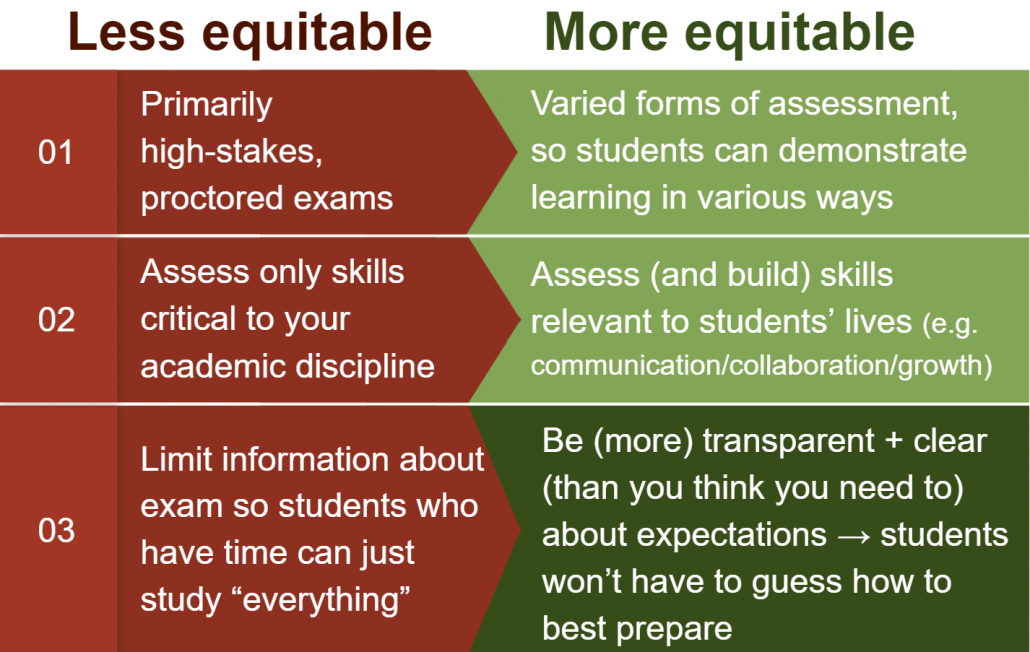
Any approach to equitable course design begins with the idea of “Backward Design”. This begins with planning learning goals and outcomes for students before planning assessments or activities to help students learn effectively. In this session, the CEILS team helped participants plan for inclusive and equitable assessment strategies that aligned with the goals and learning that they wanted their students to achieve.
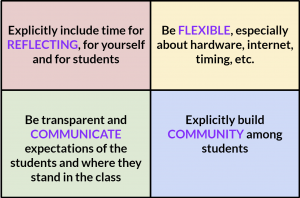 Research shows that actively engaging students in the learning process can lead to deeper and more valuable learning. Effectively incorporating active learning techniques into your lecture can help solidify the concepts they are learning. In this session we discussed strategies that could be used remotely or in-person to increase student participation and considered how to address equity issues that may arise when implementing these activities. (See 4 Four Guiding Principles for Managing Transitions to the left, developed by Karin Gosselink, Yale University and adapted to include best practices for teaching inclusively)
Research shows that actively engaging students in the learning process can lead to deeper and more valuable learning. Effectively incorporating active learning techniques into your lecture can help solidify the concepts they are learning. In this session we discussed strategies that could be used remotely or in-person to increase student participation and considered how to address equity issues that may arise when implementing these activities. (See 4 Four Guiding Principles for Managing Transitions to the left, developed by Karin Gosselink, Yale University and adapted to include best practices for teaching inclusively)

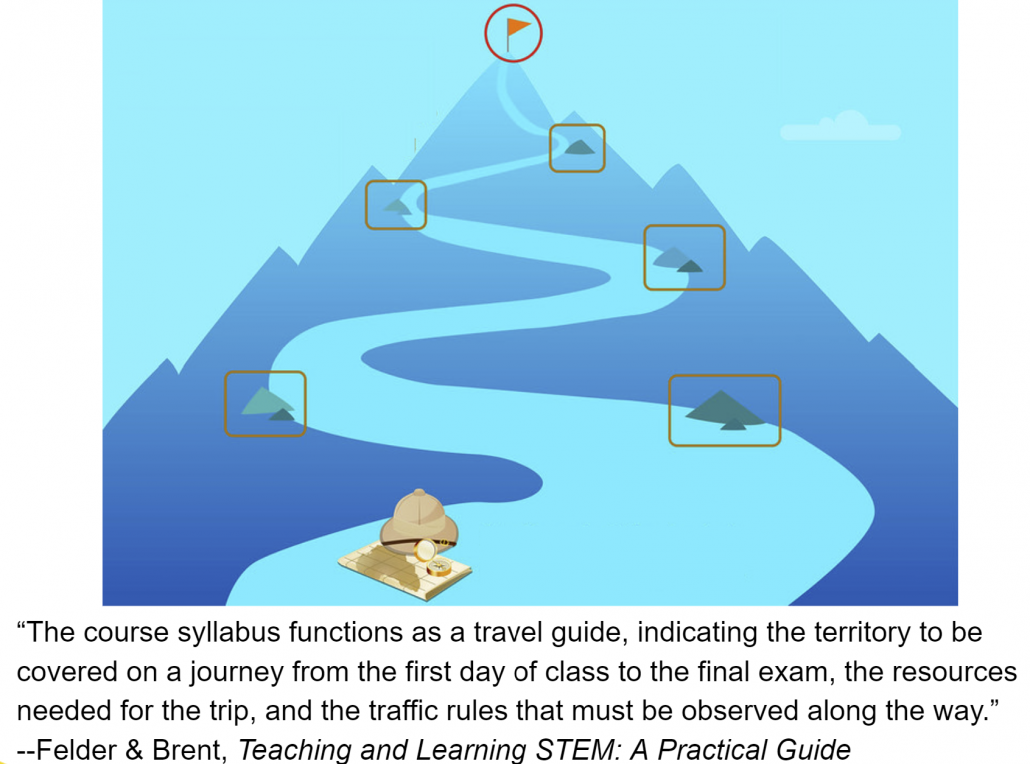
One of the first things students engage with in a course is the syllabus; it provides an introduction not only to the topics and assignments throughout the quarter, but also provides a first impression of who you are as a teacher. On top of that, research shows that students frequently refer to the syllabus through the quarter. In this session we discussed and explored ways to make our syllabi more welcoming and clear, support student learning, and encourage student success.

We were fortunate to have 5 fantastic students join us for a student panel who shared insight on their experience over the last year and a half, what instructors did well during the pandemic, and what they are most concerned about coming back to campus this fall. Below are a few quotes we pulled from the panel that we thought might be particularly useful for instructors to know:
“…even though we’re not all necessarily online anymore I think that a whole year of having to deal with that and maybe to deal with the loss of a family member or close friend is definitely going to weigh heavy on them for a while. It’s going to be difficult for them to get back in the rhythm of things and the schedule. I think also being able to recognize the outside forces or outside issues can also add on to that stress.”
“My main concern is if I get COVID or something and I have to isolate myself. If there’s an in-person class I’m taking, will I have to make it up somehow, or what would the protocol be, especially during finals week? I really don’t know what’s going to happen.”
“When I had to quarantine…the professor allowed us to have an alternate assignment to make up for an exam or assignment we missed because of an illness and it helped take a lot of pressure off what I had to do…so I could focus on my well-being and mental well-being.”
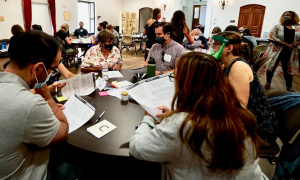 Many students and instructors have mixed emotions about returning to campus this fall; they are both excited to be able to engage with others face-to-face, but are concerned about health and safety. This was a feeling that was mirrored during our in-person workshop session. The room had an air of excitement and celebration mixed with trepidation as we brainstormed solutions to challenges to teaching in-person.
Many students and instructors have mixed emotions about returning to campus this fall; they are both excited to be able to engage with others face-to-face, but are concerned about health and safety. This was a feeling that was mirrored during our in-person workshop session. The room had an air of excitement and celebration mixed with trepidation as we brainstormed solutions to challenges to teaching in-person.
VIEW TECHNOLOGY AND REVIEW GUIDE
NOTE: This session was recorded in-person with face masks, unreliable microphones, and other acoustic interference that compromised the quality of the auto-captions.

This Fall CEILS piloted a new workshop for faculty called “Teaching with TAs: Intentionally Building Communication, Boundaries, and Mentorship within the Teaching Partnership”. In the workshop we discussed challenges that TAs face and ways that instructors can more efficiently engage TAs as part of a team while respecting their roles as student-teachers.
Learning Outcomes:
VIEW THE WORKSHOP RECORDING, RESOURCES, AND SLIDES HERE.
The Center for the Advancement of Teaching presented the third annual UCLA teaching symposium — Teaching at UCLA: Looking Forward with 2020 Vision.

Description: This symposium took place during the third week of spring quarter, April 12th-16th, and focused on the theme “what we learned from remote teaching that we can apply to the future when we are back in person.” Sessions will be hosted by the Center for the Advancement of Teaching (CAT), Excellence in Pedagogy and Innovative Classrooms (EPIC), and Online Teaching & Learning (OTL), and CEILS.
Description: In the fall and winter quarters, 40 Life and Physical Science faculty participated in “Out of the Box” – a program that guided faculty through evidence-based course transformations centered around equity. In this panel, some share what they learned from implementing new teaching strategies to make their classrooms more equitable and inclusive. They will talk about lessons learned and what they will continue to use when we return to in person or hybrid teaching.
Description: Join CEILS for an interactive discussion about the different situations many of your students may be facing in the fall, so that you can practice how you might adapt your course structure to provide equitable opportunities for these students to succeed, while considering the constraints of large courses and/or minimal TA support.
Description: If you haven’t heard of the Gradescope grading program, or you have but don’t know how to use it, come to this interactive workshop where we will guide you through the use of this effective platform for saving time for you (and your TA’s!) while using more fair and equitable grading practices. Gradescope is most appropriate for assessments that involve open-ended questions (e.g. solving problems, drawing, or short answer), but it also has useful tools for grading multiple choice questions more creatively (e.g. ranking, giving partial credit for various sets of multiple choice responses, etc.).

Facilitated by CEILS Interim Director Rachel Kennison, Senior Associate Director Shanna Shaked, Assistant Director Katie Dixie, and Dr. Jennifer Casey (Lecturer in Chemsitry), Kiana Foxx (PhD Candidate in Higher Education and Organizational Change), and Benjamin Ha (PhD Candidate in Ecology and Evolutionary Biology).
Description: Whether you are new to remote teaching, or are building on your past experience, our workshops are designed to support you in evolving your practices in Winter 2021. Note that these will be the same as those offered at the Fall Teaching Forum in September 2020.
Description: In this workshop, you will use structured syllabus review tools to help you assess and adjust your syllabus to be more inclusive and equitable.
Description: The emphasis here is shifting (at least in part) from “traditional” closed-book and timed exams to more authentic assessments where students can demonstrate how they are applying what they learn; we include strategies to save time in grading such assessments. Join us to learn about an array of assessment options, hear about what’s worked well for colleagues, and get time to adapt and troubleshoot your own assessment plans.
RECORDING COMING SOON
Description: Active learning and student engagement may look different online, but the remote teaching environment makes these techniques even more critical to having an equitable course. Learn about how faculty engage students online and determine which approaches are most appropriate in your course.
RECORDING COMING SOON
Description: This session will continue our discussion from Part I to include a deeper investigation of the specific tools and strategies to incorporate effective and inclusive group work remotely. Learn about how faculty engage students in group work and collaborative learning online and determine which approaches are most appropriate in your course.
RECORDING COMING SOON
UCLA’s Center for the Advancement of Teaching (CAT), the Center for Education, Innovation, and Learning in the Sciences (CEILS), and the Excellence in Pedagogy and Innovative Classrooms program (EPIC) have collaborated to launch a campus-wide forum focused on supporting all instructors and faculty with teaching remotely in Fall 2020.
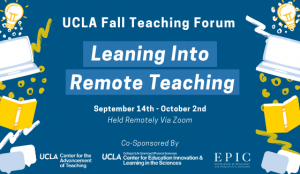
Description: Stretching over three weeks from September 14 to October 2, the 2020 Fall Teaching Forum: Leaning Into Remote Teaching reimagines several events held annually each fall–including CAT’s New Faculty Teaching Engagement event, CEILS’s Annual Faculty Workshop, and EPIC’s Ready, Set, Teach event. This new joint effort showcases success stories and lessons learned from spring quarter, and provides an opportunity for instructors to collaborate within and across disciplines as we all prepare for the fall term.
Please visit the UCLA 2020 Fall Teaching Forum website for a full list of workshops offered, as well as materials and resources associated with each workshop.
Description: The premise for this workshop is to first examine one’s own racial identity development as a way to authentically prepare for teaching equitably and inclusively. In order to help foster a brave space for dialogue, these sessions were not recorded during the Fall Teaching Forum. We have, however, included the session materials, such as activities guides, as a resources for question prompts and figures.
Description: In this workshop, you will use structured syllabus review tools to help you assess and adjust your syllabus to be more inclusive and equitable. The focus will be on fostering an inclusive and equitable remote learning experience to mitigate the likely worsening equity gaps in higher education.
This session was facilitated by CEILS and CAT, with panelists: Muriel C. McClendon, Albert J. Courey, and Richard Wesel.
Description: The goal of this workshop is to learn how we can: 1) Decrease the likelihood that students will be dishonest, 2) Minimize cheating without exacerbating inequities brought on by differential access to technology, 3) Motivate students to prioritize learning over cheating, and 4) Make sure courses are still rigorous if we change the type of assessments we use.
This session was facilitated by CAT’s TA Training Program and CEILS / CIRTL.
Description: Through hands-on activities and small group discussion, this workshop helps attendees uncover best practices for creating community remotely. Learn more about available tools, investigate a variety of strategies, and think through how you might implement strategies in your classroom and life.
This session was facilitated by CAT’s TA Training Program and CEILS / CIRTL.
Description: The session will be centered around questions of disruptions and difficulties that TAs are experiencing, how faculty and TAs can best communicate with each other, how to manage work expectations in this time of disruption, and how to function as a team in order to meet students’ needs.
Description: Active learning and student engagement may look different online, but the remote teaching environment makes these techniques even more critical to having an equitable course. Learn about how faculty engage students online and determine which approaches are most appropriate in your course.
Description: The goals of this workshop are to understand how and why assessments should be made more effective and equitable, to take a look at the list of alternatives recommended by cross-campus committees, to determine the importance of aligning your assessments with relevant student learning, and adapt assessments for your own course.
This session was facilitated by William Conley, on behalf of CEILS.
Description: CEILS will guide you through an introduction to Gradescope, a tool used to help grade efficiently and equitably online. Learn more about how you can use Gradescope in your future classes!
Facilitated by CEILS Interim Director Rachel Kennison, Senior Associate Director Shanna Shaked, Assistant Director Katie Dixie and Dr. Jennifer Casey (Lecturer in Chemistry), Kiana Foxx (PhD Candidate in Higher Education and Organizational Change), Benjamin Ha (PhD Candidate in Ecology and Evolutionary Biology), and Samantha Theresa Messah (PhD Candidate in Chemistry & Biochemistry).
Description: Using an equitable approach to teaching benefits all students. In this series, you will work with colleagues, guided by CEILS experts, to discuss and redesign your syllabus, assessments, and approaches for effective student engagement. The focus will be on fostering an inclusive and equitable remote learning experience to mitigate the likely worsening equity gaps in higher education. The principles we are using are applicable to when we go back to in-person teaching, so the time you spend on these best practices will not be wasted! You are welcome to attend any or all of the workshops.
Description: In this workshop, you will use structured syllabus review tools to help you assess and adjust your syllabus to be more inclusive and equitable. Don’t forget to bring a syllabus with you!
VIEW SLIDES AND ADDITIONAL MATERIALS
Description: Join us to learn about an array of assessment options, hear about what’s worked well for colleagues, and get time to adapt and troubleshoot your own assessment plans.
VIEW SLIDES AND ADDITIONAL MATERIALS
Description: Active learning and student engagement may look different online, but the remote teaching environment makes these techniques even more critical to having an equitable course. Learn about how faculty engage students online and determine which approaches are most appropriate in your course.
Facilitated by CEILS Interim Executive Director Rachel Kennison and Associate Directors Shanna Shaked and Jess Gregg.
Description: This foundational workshop will prepare you to teach summer classes remotely, in a way that goes beyond the emergency crisis teaching situation we all faced in the spring. Although we acknowledge that this is still a crisis situation, we will provide you with additional tools, support and tips to create a teaching experience that you can feel confident about and a learning environment that is engaging and optimal for all of your students.
Facilitated by CEILS Associate Directors Rachel Kennison, Shanna Shaked, and Jess Gregg.
Description: These sessions will provide a framework to help you plan to deliver the first weeks of class in an online format. We will discuss which elements of your course will need to be adapted, how to plan for interactivity and engagement online, review existing open educational resources, and share ideas that you may want to include in your syllabus and course design.
Note: This is NOT a workshop on using CCLE and Zoom – for assistance with those tools and technical troubleshooting please contact your local Bruin Learn support or access trainings and support.
Facilitated by CEILS Director Erin Sanders O’Leary and Associate Directors Rachel Kennison, and Jess Gregg.
Description: In this webinar we will model how to implement interactive live activities using Zoom features including break-out rooms, screen-share, polling, and chat while incorporating additional tools like Google docs/forms. We will also review some strategies for asynchronous interactivity in CCLE discussion forums.
Facilitated by CEILS Directors Shanna Shaked, Erin Sanders O’Leary, Rachel Kennison, and Jess Gregg.
Description: In addition to sharing best practices for remote testing that disincentives cheating as well as the strengths and weakness of remote proctoring, we will spend time discussing alternative strategies to consider for remote assessment of student learning. We invite you to review the checklist currently in preparation describing recommendations from campus stakeholders across various disciplines.
Facilitated by CEILS Director, Erin Sanders O’Leary, and Life Science Core Labs Director, Gaston Pfluegl.
Description: The goal of this Zoom session is to brainstorm and discuss pedagogically optimal strategies for delivering remote/ online labs. Among us are many wonderful experts on campus who have been actively thinking about these issues already and have tried activities out in the past and thus have experiential knowledge we can all draw from in making decisions that make sense for our students. We will explore multiple approaches, with attention to accessibility issues and other equity concerns as part of the design/planning process.
Resources to Support Remote / Virtual Lab Instruction
The Chronicle of Higher Education, “How to Quickly (and Safely) Move a Lab Course Online”
Please use this link to access a spreadsheet with links to existing online materials, sorted by discipline:
https://docs.google.com/spreadsheets/d/1_qFmJQhislBobK8paTi3setQ0K8fmK4bE2M8EhKSDE4/edit?usp=sharing
Many people from education networks from across the country have contributed to this list of resources. We thank the science education community for sharing their knowledge of materials and, when possible, providing free access to resources during the coming term.
A summary of recommendations for implementing pedagogically optimal strategies to deliver remote / online labs is forthcoming and will be accessible via this link:
https://docs.google.com/document/d/1maHblpI–s4zoWvyOUyWgn3Kl7Aj3VtuS0_Vy9F628c/edit?usp=sharing
Link to webinar presented by Labster, a virtual lab/simulation tool, “Digital Strategy in Action: Moving My Science Course Online”: https://www.labster.com/webinars/virtual-labs-science-education/
Facilitated by Will Conley, Assistant Teaching Professor of Mathematics (LPSOE)
Gradescope is a great tool that can be utilized by instructors and TAs to score assignments with open-response questions (e.g., exams, quizzes, homework problems). This platform also allows for easy uploading of student documents remotely. UCLA has a licensing agreement with Gradescope (www.gradescope.com) for their online grading tool, which can be incorporated into CCLE course sites. At this webinar, learn how to set up Gradescope in CCLE and incorporate some helpful grading features for your class.
Benefits to instructors and TAs:
Benefits to students:
There’s an app for that!
Here is an app you can share with your students to scan their homework into a pdf: https://acrobat.adobe.com/us/en/mobile/scanner-app.html
How to add Gradescope to your CCLE course site
Instructors may incorporate this grading tool into their CCLE course sites by following the instructions provided on CCLE (click here) and summarized here as follows:
Tips for Using Gradescope at UCLA
For additional tips using Gradescope, please click here to see our FAQ document. You may email media@ceils.ucla.edu if you need further assistance.
Facilitated by Gaston Pfluegl, Lab Director for LS Core, CEILS Instructional Consultant
Description: Captioning videos is an important step to take to ensure that they are accessible for all students. This webinar will demonstrate how to do this using CCLE tools as well as add interactivity to your video content.
Facilitated by CEILS Director Erin Sanders and Associate Directors Rachel Kennison, Shanna Shaked and Jess Gregg.
Time stamps in the recording: